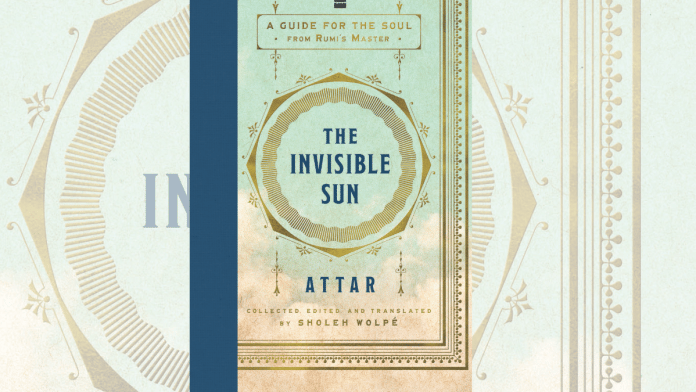New Delhi: The Invisible Sun by Sholeh Wolpé centres on the Sufi understanding that the soul is imprisoned in the body and seeks reunion with the Creator. The book explains that this union cannot be attained through scripture or rational inquiry but through inner cleansing and devotion. It stresses that sacred texts or scholarly learning are not the gateway to the Divine; rather, the approach must be rooted in love directed toward the ineffable. And the journey is described as a “Wayfaring” path where one must begin by awakening from spiritual slumber, prepared for alternating phases of separation and divine closeness. Movement, struggle, and the willingness to take the first step are emphasised.
The book repeatedly frames the ego as the greatest barrier to divine union. Ego is defined as the “lesser self, the upholder of self-righteousness and self-proclaimed truths,” and “death” in the poems often signifies the death of this ego rather than the body. Attar urges abandonment of selfhood: “So long as you are something, how can you enter nothing?” and “Lose yourself in the Beloved — that is unity.” Unity is not uniformity, but a state achieved by ego dissolution. Any attachment to self—even a “strand of hair”—prevents the seeker from reaching the Divine.
The Divine is presented as universal, beyond religious boundaries. It is referred to using many names, God, Allah, the Universe, Jehovah, or Dios, while being tied to none. Attar “does not side with any one faith, religion, or belief system,” instead guiding readers toward direct spiritual realisation. The ultimate revelation is the uncovering of the “invisible sun” within, where “the veil falls away” and dualities dissolve, leaving only the seeker and the Divine. Service, humility, and ego death are upheld as the highest states, and spiritual realisation is depicted as both the journey and the destination.
Featuring the verses of 12th-century Sufi poet Attar, translated by Sholeh Wolpé and published by HarperCollins, ‘The Invisible Sun’ will be released on 13 November on SoftCover, ThePrint’s online platform for launching non-fiction books.
Attar, also known as Shaikh Farid-ud-Din or Attar of Nishapur, was born in 1145 in Nishapur, Iran. His name means perfume maker and herbalist; he worked as a pharmacist, healer, and interpreter of illnesses. He chose this profession to avoid being a court poet tied to royal patronage. His death is associated with the Mongol massacre of Nishapur in 1221 CE, with popular tales portraying him refusing to be sold for coins before being executined. Forty books are attributed to him, seven verified, and his work influenced thinkers including Rumi. His mausoleum stands in Nishapur, and he is revered as a major Sufi mystic.
Also Read: New book delves into India’s long journey of the development state






